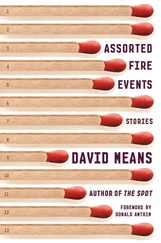* * *
In his operations report he’d write about how they got around to the back of the house undetected, on tiptoe, past a mound of cycle parts rusted together — smelling of rust and oil — and then past a pump with a broken handle (every farm in the state had a pump with a broken handle). Discrete puffs of smoke rose from the forge structure, white, signaling to the sky. Singleton put his finger to his lips. Let the scene gather some meaning, he thought. Hearing the absurd pounding of his own heart, he wondered if his ability to sense danger ahead had been enfolded, or simply lost in the war. Wendy watched as he lifted his gun, held it like a divining rod, let it quiver slightly, and then, as if following its advice, moved forward with a sudden assuredness along the side of the house toward the front porch. (Why the front? he might be asked later. We went to the front because the front was maximally distant from the forge, and the forge was emitting bad vibes, not just smoke — I mean, it was weird smoke, sir. So we went around to the front and I told Agent Wendy Z to wait. I used the recommended hand signals. I did the toe-to-heel walk, as instructed. )
On the porch he touched the top of his head once with his palm, and then swung one arm in a windmill motion, the old Nam signal to provide cover. He stood and listened. Just the tick of wood contracting in the cool night. Another rotting porch in a state of rotting porches. He moved slowly to the window and then swept a portal in the dust and ash. Wendy came up behind him as he peered inside, trying to make sense of what he was seeing. In the pale light from under a door he could see an old pump organ against one wall. Hanging from the ceiling were six vague shapes, slightly conic, widening as they approach the floor, swaying slightly. He looked out the corner of his eye. The six shapes were bodies hung by their feet, bound tight, with arms extended out to the floor beneath them, some of them moving slightly.
(He knew what he’d have to say when he was being debriefed. He’d say it took him a while to make sense of what he was seeing, those forms hanging down, although for God’s sake the truth was he knew right away what he was seeing.)
“He’s hanging them by their feet.”
Beneath the shapes were oily pools of blood. (No, sir, he’d say. We weren’t sure what we were seeing exactly. They were slightly conic in shape and seemed to be swaying — but the light coming from the back room, a bit of light from under a door, was hardly enough to make them visible.)
A voice came from the yard. It was deep, husky, with a French-Canadian accent. “Them is the ones on the edge of oblivion, not quite there yet but on the way.”
Singleton and Wendy stopped breathing.
“Give me the passphrase and I’ll consider your salvation. Otherwise you’ll hang up there with those folks.”
“The dominion of the Corps is over memory ceded to terror,” Singleton said.
“Non-fucking-sense,” the voice said. “That was last month’s passphrase. Every man north of Grand Rapids knows that one. Give it one more try and get it right or you’re dead. This old buddy of mine is itching to go off. The clip longs to ease the burden of the spring, so to speak.”
Singleton visualized the rectangular spring pressing the follower. (Don’t remove the follower from the spring when cleaning, he remembered. Jiggle spring follower to install. If the spring comes loose, turn in the pieces. Don’t fix in the field.)
“Come out with it, folks,” the voice said. “Last chance to give the correct passphrase.”
“The stillness within is still within,” Wendy said.
“Correct,” the voice said. “Now turn around so I can get a look at you.”
He was at the foot of the stairs holding his flashlight to his chin. His face was caked with ash. He waved them down with the gun.
“We’d better go around back. You never know who might be watching us out there.” He gestured at the woods with the gun. “You two trainees look so out of place I’m surprised you’re not dead right now.” He staggered in his buckskin chaps, swinging a gimpy leg, motioning for them to follow him around to the back of the house. He opened the forge door and led them into a dark room with a low ceiling. The forge wasn’t much, just a small brick structure with a pile of charcoal and a bellows beneath a steel hood. Hanging from the ceiling — Singleton imagined he’d write in his report, if he lived — were all manner of motorcycle parts, chopper bars, along with what looked to be dried animal hides or jerky.
“The name’s Merle,” he said, bowing slightly. “The gang members, the wayward failed enfolds, whatever you call them down there, catch the scent of the smoke and know I’m working metal. That lures them in here and I do some work on their choppers and gain some trust. I was a biker myself, before the Corps got ahold of me, so to speak. I enjoy orderly flames after seeing so much fire that wasn’t controlled, so to speak.”
He lifted up his shirt to show a scar that flared out from his belly. (A burn scar, Singleton thought. If I were looking for conspiracy I’d say we’re linked.)
“This doesn’t look like much, but it produces brilliant heat,” he said. He pumped the bellows and stuck a poker in and shifted the coals.
Singleton would put in the report that the fire hurt their eyes because the zip pills made light too light. We were standing there blinking, trying to see in the brightness.
“I’d do some work for you. It’s wrong to betray a hot fire by not using it. I mean that’s the way I look at it. Out of respect for fire you’ve got to use it whenever it’s hot,” he said, leaning down and blowing on the coals.
“We’re not here to watch you work,” Singleton said. “And I’m sure the fire wouldn’t mind if you let it alone for a while.”
“The fire minds what it wants to mind. That’s why it’s a fire.”
“Well, then it won’t mind if we don’t mind it for a few minutes while you explain what the hell is going on here,” Singleton said. The man stood back and held himself straight for a moment as if pondering not only fire itself but all of the rest of the elemental aspects of the world.
“It might mind, but you wouldn’t know it,” he said.
“Well, then you can say we didn’t know. You can blame it on us.”
“I guess you might be right. You knew the password for the week, and you’re both blinking like you’re on zip pills. Klein sent a courier a few months ago who said someone might be coming, but the date and time were to be determined later. Said there was a possibility of two agents — trainees — something like that. I don’t pay a hell of a lot of attention to what’s going on down there. Too busy.”
“Did Klein give you a message?”
“I believe it was someone named Klein. Never caught his first name.”
“Klein in Status.”
“You know I can’t confirm that. Have to limit the information flow. Just leave it at that. I knew you two were coming.”
“But you said it was Klein?”
“Did I say that?”
“Yes.”
“You’re hearing the zip pills. I said no such thing.” The man ran his palm across his forehead, leaving a smear of char, or ash. “Before I take you in there to see what you saw when you looked through the window, I’d like to say a few things. I’m afraid you might not be so happy when I throw the light switch. It might present itself to be a mite bit, how should I put it? Visceral. Mean to say, it might not cast the best light on me as upholding the standard of the Corps, the Credo and all that, but let me say that you’ve got to push some of these folks as close as you can to the edge but not over before they’ll give up any information, and I’ve got a logbook of data that will likely prove useful to you. For example, if you tell me who you’re looking for, if he isn’t hanging up out there, I might be able to provide you with information, because anything that’s going on in these parts, from here to north of the Hudson Bay, is in the logbook,” he said. “If it isn’t in the book, it hasn’t happened yet, or I just haven’t had a chance to catch and interrogate the targets, although, if I do say so myself, eventually most of the failed enfolds, the waywards, will find their way here, because there’s something about the stench of a forge that lures them in. They long for the days when hot metal was worked — by their fathers down in the mills in Gary, or Flint, or Akron.”
Читать дальше












